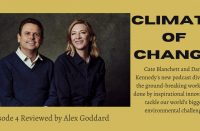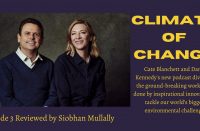After announcing his Carbon Manifesto in front of the Toronto Courthouse, David Suzuki was part of a mock trial held on November 6, 2013 at the Royal Ontario Museum (ROM). The premise of The Trial was that Suzuki committed seditious libel by “express[ing] an intention to… publish or circulate… writing that advocates the use, without the authority of law, of force as a means of accomplishing a governmental change within Canada (Criminal Code, 1985, s.
After announcing his Carbon Manifesto in front of the Toronto Courthouse, David Suzuki was part of a mock trial held on November 6, 2013 at the Royal Ontario Museum (ROM). The premise of The Trial was that Suzuki committed seditious libel by “express[ing] an intention to… publish or circulate… writing that advocates the use, without the authority of law, of force as a means of accomplishing a governmental change within Canada (Criminal Code, 1985, s. 60).” A\J sat down with its creator Laurie Brown to discuss the unique performance and her reflections.
Holding a mock court is common in the legal community; it is often used to look at new ideas and realities in the world, and to test how the law might respond. The event followed the conventions of a formal trial, yet it was entertaining and accessible—maintaining the essence of a theatrical performance. A variety of practicing professionals took part—a judge, lawyers, expert witnesses and a pre-selected jury—as well as the public. The event was streamed online, empowering viewers to join the live audience in making the final verdict.
David Suzuki’s Carbon Manifesto began by announcing that we are engaged in “willful blindness” and are accountable for failing to take meaningful action on climate change. He accused Canadian politicians of “intergenerational crimes,” and both the government and Canadian corporations “of immoral activity with devastating consequences.” He then presented five calls to action, calling for: (1) an end to fossil fuel exploration and subsidies within a generation, (2) protection for the Boreal forest and our oceans, (3) 70 per cent renewable energy within one generation, (4) an immediate carbon tax of $150 per tonne and (5) Canadian climate scientists to be able to share their findings uncensored and unimpeded.

A sketch artist draws Suzuki’s likeness as he addresses the jury.
Photo by Jacqueline Waters for the ROM.
Judge Todd Ducharme led the formal proceedings and encouraged the jury “to partake in tweeting and blogging.” Prosecution and defence lawyers, Will McDowell and Linda A. Rothstein respectively, presented their perspectives and tested the accuracy of the evidence through cross-examining expert witnesses: economist Michael Hlinka, Ontario’s Environmental Commissioner Gord Miller and Suzuki himself.
An element of theatre has already entered societal conversations about important issues like climate change; discussions are increasingly polarized and divisive and so “we refuse to invite any complexity into anything,” remarked Laurie Brown. Dialogue is often degraded by weakening the sources of climate data and discussions are stalled by focusing on the minute details of climate change; for instance whether a 2 degree or 2.5 degree rise in global temperatures will be the tipping point.
The trial focused on natural resource extraction, energy and the proposed carbon tax, especially potential economic impacts: from a reduction in Alberta’s GDP and the value of the Canadian dollar, to the unknown and un-accounted for costs of climate change. Throughout the discussion, I couldn’t help but notice that David Suzuki was cautious to make explicit judgements about economist Michael Hlinka’s reasoning for possible disastrous economic impacts for Canada. However, Hlinka freely commented on the scientific evidence presented—despite his lack of knowledge on the topic.
The performance’s value stemmed from its adherence to the rules of engagement inherent to a formal trial. Unlike in a debate, the balanced format allowed each proponent to present their case without the conversation veering off into unintended directions. Participants have since told Brown that the format created a “safe place” for engagement and enabled a real conversation about the end of oil in Canada.
During the trial, defence lawyer Linda A. Rothstein remarked that the only rational way to proceed is to enact measures to cause a transformational change of our current behaviours. Addressing climate change will alter our economic landscape; both sides of the argument agreed with this statement. Suzuki maintained that opportunities will come out of our search for alternatives, as they have as a result of other changes throughout history.

Environmental Commissioner Gord Miller presents his points to Judge Todd Ducharme and Defense lawyer Linda A. Rothstein in front of a live audience as David Suzuki looks on.
Photo by Jacqueline Waters for the ROM.
Suzuki’s Carbon Manifesto takes up the charge of scientists before him and asks Canada to lead by example. Despite differing perspectives on Suzuki’s messaging, Brown says that he is “kind of a lightning rod for both sides of the argument;” his presence attracted attention and brought both sides to the table.
The performance was part of Cape Farewell Foundation’s Carbon 14: Climate is Culture. The event was accompanied by You Be the Judge and Opposing Views—video billboard and subway poster campaigns that presented conflicting perspectives about climate change and Dr. Suzuki’s views.
Related: Check out Grace Johnstone’s review for more information about the ROM’s feature exhibition Carbon 14: Climate is Culture.
Cape Farewell Foundation’s mandate involves engaging a broader audience in conversations about environmental issues. Laurie Brown herself is a success story; she was largely outside of climate-related discussions prior to her involvement in a 2011 workshop that led to the creation of Climate is Culture. Cape Farewell’s public engagement efforts encouraged Brown to create The Trial of David Suzuki and become actively engaged in stimulating conversations about environmental issues.
Climate is Culture coincides with the Intergovernmental Panel on Climate Change’s release of its Fifth Assessment Report (AR5), which has been heralded as the “the most comprehensive assessment of scientific knowledge on climate change since 2007.” The report presents new research findings, and discusses drivers and future predictions of global and regional climate change.
Related: 3 Mistakes the Media Are Making About the New Climate Change Report
The Trial of David Suzuki itself has become a launching off point for further conversations and interventions related to the topic of climate change; Laurie Brown herself has a “viral public engagement campaign in the works.” Brown and Suzuki, along with Cape Farewell Foundation, hope that The Trial of David Suzuki and Carbon 14: Climate is Culture can be a continuing call for action. As Suzuki proclaimed, “the challenge is to seize the moment. The IPCC has set the challenge; now we need to seize the opportunity.”
Reviewer Information
Amy is a graduate student at the University of Waterloo pursuing a Master of Arts in Planning, with a focus on the adaptive reuse of historic buildings. She has an Honours Bachelor of Arts in Studio Arts from the University of Guelph and is interested in built and natural heritage conservation, photography, all forms of culture, and identifies as a maker.












